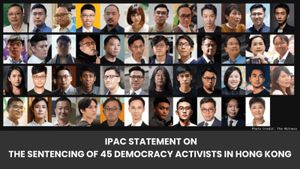At the forefront of global environmental discussions this week, negotiators gathered at the Busan Exhibition and Convention Centre, South Korea, for what is deemed the fifth and possibly final round of negotiations for the United Nations' historic plastics treaty. Following the recent conclusion of the climate conference held in Azerbaijan, the urgency surrounding these negotiations is palpable as various countries strive to combat the rising tide of plastic pollution. With hopes of solidifying agreements finalized by December 1, leaders urged delegates to embrace the "bold political will" necessary to tackle plastic pollution, which they claim could be threatening the planet's health and humanity's future.
The stakes are exceptionally high at this round of talks, identified as INC-5, primarily focusing on one contentious issue: whether to impose direct limits on global plastic production. Proponents of such caps argue it's the only way to fulfill the treaty’s ambition to "end plastic pollution." Many countries demand stringent regulations, aligning with various environmental groups and scientists who express concern over the health and environmental impacts exacerbated by rampant plastic production. Unfortunately, getting fossil-fuel-rich nations on board with these caps poses significant hurdles.
South Korea’s environment minister, Kim Wan Sup, echoed sentiments of urgency, stating, “We must end plastic pollution before plastic pollution ends us.” These discussions come amid rising awareness of plastic’s detrimental impact on wildlife, ecosystems, and even human health, with microplastics now found infiltrated within human bloodstreams. Numerous studies establish troubling links between plastic and health issues, including various cancers and reproductive disorders.
For some advocates, likening the plastic crisis to "mopping the floor" of a flooded bathtub conveys the inadequacy of merely cleaning up existing waste without addressing the source—the continuous production of new plastic. Environmentalists assert the need to "turn off the tap," thereby restricting the manufacturing of plastic materials to decrease overall pollution levels effectively. This strategy could also assist significantly in reducing greenhouse gas emissions—the production of plastic is highly carbon-intensive.
Yet, these negotiations have not been straightforward. The American Chemistry Council, representative of the U.S. plastics industry, has opposed production limits, arguing it could hammer the economy, costs jobs, and may inadvertently lead to increased greenhouse gas emissions due to heavier alternative materials. Such assertions have found traction among several nations, undermining the collective push for production caps.
Even more disheartening for environmental groups was the recent geopolitical shift, as the United States under the incoming administration of President Donald Trump signaled it would retract previous support for capping plastic production. This reversal is significant, as Trump hinted at appointing cabinet members who are typically more aligned with industry interests rather than environmental initiatives, leaving advocates fearing decreased commitment to tackling plastic pollution at the highest levels of government.
Grassroots advocates from areas severely impacted by petrochemical industry practices, such as Louisiana’s infamous "Cancer Alley," have also made the pilgrimage to Busan, determined to voice the struggles of their communities suffering the brunt of pollution. Jo Banner from The Descendants Project remarked, “We want to work toward the most ambitious treaty possible—one acknowledging the damaging impacts of plastics from extraction to waste.” Their presence at the treaty talks aims to bridge the gap between the representatives of the affected communities and the influential policymakers on the global stage.
Meanwhile, tensions have surfaced as multiple nations, particularly those reliant on fossil fuel production, engage in tactics perceived to stall progress. Notably, Russia and Saudi Arabia have been at the forefront of efforts to delay agreements, lifting procedural hurdles to obstruct votes on key treaty issues. Critics have voiced concern over this undermining of the negotiating process, with many predicting it could lead to mere token regulations rather than the substantial measures required to combat the extent of plastic pollution.
Indeed, industry representation is also significant at the talks, with representatives from major corporations advocating for pathways emphasizing waste management instead of production limits. The International Council of Chemical Associations has underlined the detrimental impacts they perceive limits would impose on economic viability and affordable plastic accessibility, generating controversies surrounding balancing environmental and industrial needs.
Despite the growing dissent, not all business entities oppose reductions. A coalition of brands including Nestlé, Unilever, and IKEA, part of the Business Coalition for Global Plastics Treaty, has voiced support behind reducing plastic production. Their interest isn't solely altruistic; it stems from recognizing the long-term sustainability of their operations within increasingly eco-conscious markets. Jodie Roussell from Nestlé emphasized, “Businesses can’t do it alone, and we need multilateral legislation to be put in place.”
On another front, smaller firms have rallied under the "Champions of Change" banner, calling for ambitious treaty goals aimed at halting the proliferation of single-use plastics. Around 300 small businesses have come together to demand significant production cuts by 2040.
This year's negotiations are not without their inherent frustrations. A widely circulated 70-page draft treaty document is reportedly cluttered with disagreements, adorned with nearly 1,900 contested sets of language. Many seek to prioritize cleanup and recycling efforts over ancient remains left behind by production, threatening to turn discussions toward voluntary commitments rather than binding obligations.
Although there have been some progress and commitments forged at previous meetings, observers suggest complications like outlined production caps have reached across broader geopolitical channels, complicate real strides through the negotiating sessions. Participants advocate for stronger provisions, stressing urgency against the backdrop of the impending climate crisis.
While global plastic production is at unprecedented levels, the urgency and potential ramifications motivate the attending delegates, sparking aspirations of crafting strong agreements capable of spurring real change. Activists remind the delegates gathered here, “governments, the world is watching, cut plastic production now,” aimed at encapsulating the pivotal moment embedded within their negotiations.
Time will reveal whether these key gatherings yield the ambitious agreement needed to confront the overwhelming plastic threat threatening ecosystems, economies, and human health worldwide. Now, as countries face possible splits within their ranks—balancing national interests against collective goals—face-to-face dialogue could prove decisive on the road forward.



